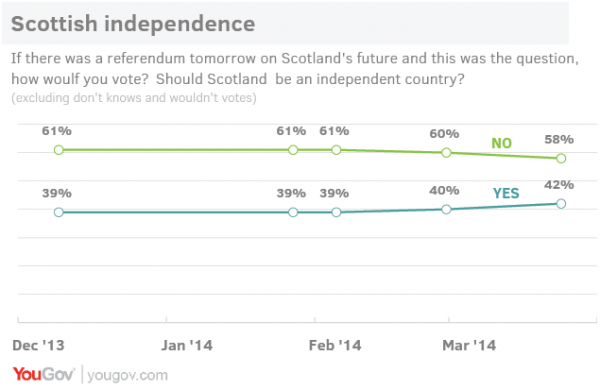The latest YouGov poll shows that now 37% of all Scots would vote Yes, while 52% would vote No. The race could be tighter than both the Yes Scotland and Better Together camps believe, or would prefer. But even if Scots do vote to remain part of the United Kingdom in September, does this mean that Alex Salmond’s dream of an independent Scotland is dashed forever?
Perhaps not. There is a natural parallel with the debate on a referendum for continuing membership of the European Union. Both have become closely contested issues in the polls, and both are influenced by smaller parties punching above their weight. But what else could both sides learn from the EU referendum debate? One element – gone unnoticed by pundits, yet is a central argument for having an EU referendum – is that unless you are approaching your 60s, you have never had a say in whether the UK should be a part of the European Union. This is a mainstay of the pro-referendum campaign, and includes politicians from across the political spectrum, as well as some of Britain’s most widely read newspapers.
Whatever happens in the vote for Scottish Independence, the fact is it has now become a part of both the national consciousness for both Britain and Scotland. This may be part of a covert plan for independence in the future, or an aspect that in the heat of the moment, has not been considered by either side.
Salmond and the SNP may lose the battle for 2014, but the war of (Scottish) Independence is – as we have seen with the EU referendum – very likely to rear its head again, as we hear Scotland cry out that only those a generation ago had a say on whether their country can remain part of the United Kingdom’s family of nations, and that they should have their say again.
This is a long term consideration for pro-union and pro-independence camps in the UK, but one that needs to remain in the back of their minds. If the union wins the vote in September 2014, they cannot neglect what may happen in September 2054. Like the EU referendum debate, we may be reconsidering the question of Scottish Independence again in 40 years’ time.
Antonio Dorileo is an Account Executive with PLMR, and previously worked for the London Labour Party during the Mayoral Elections in 2012.





